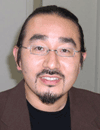Co-Located Conference AgendasFlow Chemistry Europe |  Other Track Agendas Other Track AgendasChemical Biology | Formulation and Solubility | Fragment Based Lead Discovery | Targeting Protein-Protein Interactions |

Tuesday, 19 March 201308:00 | Registration | |
Chemical Proteomics | Session Sponsors |
| | 09:00 |  | Keynote Presentation Discovery of Non-traditional Peptide Therapeutic Leads Accelerated by the RaPID System
Hiroaki Suga, Professor, The University of Tokyo, Japan
This lecture presents a novel technology that enables for the discovery of non-traditional peptide therapeutic leads against various drug targets. |
| 10:00 | Chemical Biology Approaches to Target Protein Modification in Disease
Edward Tate, Professor of Chemical Biology, Imperial College London, United Kingdom
I will highlight some of our recent advances in probing protein lipidation using chemical proteomics, and describe how we have applied this technology to identify and exploit novel drug targets in protein lipidation pathways in infectious disease and cancer. | 10:30 | Coffee Break and Networking in the Exhibition Hall | 11:15 | Chemical Biology of Ubiquitination, Proteolysis & Antigen Presentation
Huib Ovaa, Group Leader, Netherlands Cancer Institute, Netherlands
Latest developments in assay development will be discussed including chemical ubiquitination strategies. Assays to study proteasome activity and T-cell function will be also be discussed. | 11:45 | N-Acyliminium Ion Chemistry in Chemical Biology of the GPCR’s
Morten Meldal, Professor Head of Nano-Science Center, University of Copenhagen, Denmark
N-Acyl iminium ion chemistry proved extremely versatile in conversion of peptide library assemblies into small molecule libraries suitable for investigation of receptor signaling on solid support. Monoclonal GPCR - reporter gene cell lines were developed and grown in monolayers on solid phase small molecule libraries. The interaction of GPCR’s with supported ligands and receptor signaling was investigated. | 12:15 | Lunch and Networking in Exhibition Hall | 13:30 | Poster Viewing Session | 14:15 | Probing Host - Pathogen Interactions using Scaffolded and Assembled Peptides as Protein Binding Site Mimetics
Jutta Eichler, Professor, University of Erlangen-Nuremberg, Germany
Synthetic protein binding site mimics have proven excellent tools to explore HIV - host interactions. Such studies are aimed at providing insight into the molecular details of protein-protein interactions, as well as to explore novel routes of therapeutic intervention. | |
Synthetic and Computational Chemistry |
| | 14:45 | Mining Off-targets of Network Drugs
Uwe Rix, Assistant Member/Professor, Moffitt Cancer Center, United States of America
On the example of the synergy of two multikinase inhibitors in BCR-ABLT315I mutant CML cells we present a comprehensive integration of three different large-scale -omics approaches with broad potential for elucidating complex cellular mechanisms of drug synergy in general. | 15:15 | Coffee Break and Networking in the Exhibition Hall | 16:00 | Chemical Modification of Proteins
Stephen Caddick, Vice Provost for Enterprise, University College London, United Kingdom
The ability to prepare chemical modified proteins is essential for fundamental chemical biology and the development of protein therapeutics. This presentation will provide an overview of recent studies directed toward developing novel chemical methods for the selective covalent modification of a variety of proteins. A discussion of broad ranging application in chemical biology and therapeutic innovation will be presented. | 16:30 | Towards the Systematic Exploration of Chemical Space: Design, Synthesis and Exploitation of Diverse Small Molecular Libraries
Richard Doveston, Researcher, Leeds University, United Kingdom
The presentation will focus on synthetic approaches that have been developed to enable the more systematic exploration of biologically-relevant chemical space. The discovery and applications of specific novel bioactive small molecule probes will be highlighted. | 17:00 | Computational Methods for Chemical Biology
Jurgen Bajorath, Professor, Rheinische Friedrich Wilhelms University of Bonn, Germany
Computational approaches are beginning to impact research activities at the interface between chemistry and biology. Methods for computational chemical biology will be introduced and exemplary applications presented. | 17:30 | End of Day One |
Wednesday, 20 March 2013 |
Chemical Biology and Drug Design |
| | 08:30 |  | Keynote Presentation Approaches to Drugging Nucleotide Ca2+- Mobilizing Second Messenger Pathways
Barry Potter, Professor, University of Bath, United Kingdom
Intracellular calcium stores can be mobilised in an agonist dependent and second messenger-mediated fashion by two nucleotides cyclic adenosine 5'-diphosphate ribose (cADPR) and nicotinic acid adenine 2'-dinucleotide phosphate (NAADP), unrelated to the well known myo-inositol 1,4,5-trisphosphate (IP3). Early synthetic strategies and potential for pharmacological intervention in such cell signalling pathways will be discussed. |
| 09:30 |  | Keynote Presentation Two Adventures in Chemical Biology - Palladium Medicated Cellular Chemistry and in vivo Imaging
Mark Bradley, Professor of Therapeutic Innovation, Precision Healthcare University Research Institute, Queen Mary University of London, United Kingdom
My group has developed a truly heterogeneous Pd0-catalysts with the ability to enter cells in culture and mediate efficient bioorthogonal organometallic chemistry. |
| 10:30 | Coffee Break and Networking in the Exhibition Hall | 11:15 | How to Make Yeast Tremble and Suffer Energy Loss: Yeast Models for Prion and Mitochondrial Diseases
Marc Blondel, Professor, University of Brest, France
The aim of my group is to develop yeast-based models for various human diseases, including prion-based diseases, mitochondrial diseases and EBV-linked cancers. These models are then used for isolating candidate drugs for these diseases as well as new cellular pathways involved in these pathologies. | |
Chemical Cell Biology and Cancer |
| | 11:45 | Guiding Treatment Decisions in Cancer using Protein Biomarker Measurements: from Design to Utility
Stephen Pennington, Professor, University College Dublin, Ireland
The application of a range of proteomics strategies has resulted in the discovery of very large numbers of potential new protein biomarkers but few have reached clinical utility for (a) understanding the molecular mechanisms of cancer pathogenesis, (b) identifying new therapeutic targets, or (c) implementing biomarker based personalised treatment. Some of the challenges faced in the protein biomarker development process and potential solutions will be described from our recent studies on prostate cancer. | 12:15 | Lunch and Networking in Exhibition Hall | 13:30 | Poster Viewing Session | 14:15 | Positioning and Repurposing of Targeted Anti-cancer Compounds Using Ex Vivo Drug Sensitivity Testing on Primary Cancer Cells
Krister Wennerberg, Group Leader, Institute for Molecular Medicine Finland, Finland
This presentation will describe the strategy of positioning and repurposing oncology drugs as well as identifying resistance mechanisms and possible next line therapies using ex vivo drug sensitivity testing and molecular profiling of leukemic patient samples. | |
Enzyme Inhibition |
| | 14:45 | Chemical Probes to Study ADP-ribosylation - Potent and Selective Inhibitors of the Human ADP-ribosyltransferase ARTD3/PARP3
Mikael Elofsson, Professor/Associate Head, Umea University, Sweden
ADP-ribosylation plays a critical role in cell differentiation, proliferation, genome integrity and cell-survival but the exact molecular mechanisms remain elusive. We develop small molecule inhibitors that target individual members of human diphtheria toxin-like ADP-ribose transferase (ARTD) family. | 15:15 | Coffee Break and Networking in the Exhibition Hall | 15:45 | A Tankyrase Specific PARP Inhibitor
Stefan Krauss, NCS Director, University of Oslo, Norway
Tankyrases 1 and 2 (TNKS1/2) are promising pharmacological biotargets with implications for developing novel anti-cancer therapeutics. Advances in developing specific tankyrase inhibitors will be presented, and their interactions with the catalytic domain of TNKS1 and TNKS2 will be discussed. | 16:15 | Using Chemical Proteomics to Reveal Drug Targets and Drug Selectivity, Drug Mechanism of Action and Resistance Formation
Guillaume Medard, Group Leader, Technical University of Munich, Germany
This presentation gives examples for how mass spectrometry based chemical proteomics can aid at various stages in the drug discovery process including the identification of new drug targets, the selectivity of kinase inhibitors, the elucidation of the mechanism of action of drugs targeting HSP90 and identify mechanisms of resistance against targeted kinase inhibitors. | 16:45 | Close of Conference |
|


 Add to Calendar ▼2013-03-19 00:00:002013-03-20 00:00:00Europe/LondonChemical BiologySELECTBIOenquiries@selectbiosciences.com
Add to Calendar ▼2013-03-19 00:00:002013-03-20 00:00:00Europe/LondonChemical BiologySELECTBIOenquiries@selectbiosciences.com